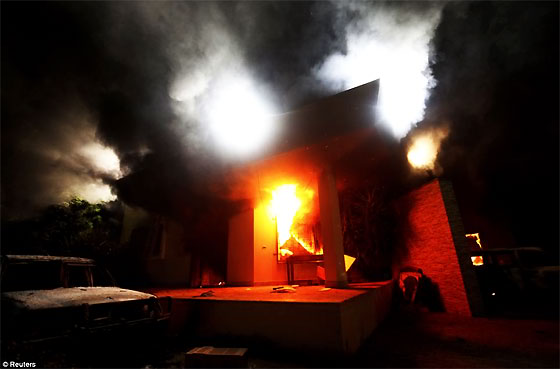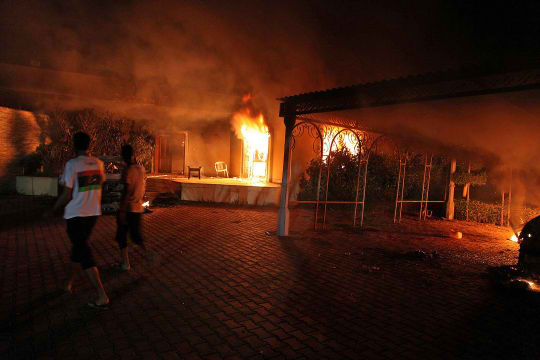
Tripoli, 13 September:
Last month’s desecration of Sufi shrines in Tripoli, Misrata and Zliten reminded Libya of the danger posed by militant Salafists to the success of the revolution.
Tuesday’s fatal attack on the US consulate in Benghazi reminded the world.
In both cases what has been most disturbing has been the government’s apparent inability to offer more than words.
Yesterday, Wendesday, National Congress Speaker Mohamed Magarief condemned the killing of Ambassador Chris Stevens, together with three of his colleagues, on the 11th anniversary of the 11 September attacks in New York and Washington DC.
Other political leaders have said the same.
Magarief offered scarce indication of any plan to hold those responsible to account, saying simply that extra security would be provided to diplomatic facilities in Libya.
Right now, extra security is the very least that is needed. Indeed, the Americans, no longer confident in Libya’s ability to secure their diplomatic premises and staff, have sent counter-terrorist units and unmanned aerial drones to do the job instead.
Diplomats from other embassies have spoken of the event as nothing short of a “catastrophe” for Libya’s international reputation and the prospect of attracting much-needed foreign investment to help put the economy on a stable footing.
What both Libyans and the international community want to see now is a genuine effort to root these problem groups out at source and to hold the perpetrators of such violence responsible for their crimes.
Few people are under any illusions that those involved in Tuesday’s attack and similar incidents represent anything more than a fringe minority of opinion in Libya.
As things currently stand, however, the strength of this fringe stands in vast disproportion to its size, and the reason for this is quite simple: impunity.
Many cities in Libya have witnessed attacks on both foreign and domestic targets in the 11 months since the end of last year’s revolution, but Benghazi stands out.
So far this year, militants in Benghazi have carried out attacks on the United Nations; International Committee of the Red Cross; a convoy carrying the British ambassador; the Tunisian consulate; and the US consulate on two occasions including yesterday.
Also ongoing is what appears to be a systematic assassination campaign directed against Qaddafi-era military officers, with 14 confirmed dead so far, and many more wounded.
To date, nobody has been arrested, still less brought to justice, for any of the attacks. Worse, there is a growing body of evidence to suggest that those responsible enjoy the cover, if not the acquiescence, of members within the security services.
It is quite probable that many officials both in government and the security services know who is responsible for these attacks and yet have failed to take action for fear of the consequences. This has to stop.
The National Congress had chosen a new prime minister who will in turn form a new government. Mustafa Abushagur will need to make the restoration of security in Libya his over-riding priority. If there is no security, there is no point concerning oneself with healthcare or education or economic policies — or anything else. Without security, a society collapses.
The current government has been constrained by many factors, but in particular the lack of a democratic mandate. Armed groups who fought against Qaddafi during the revolution, and many opportunists who did not, have been able to operate with a certain autonomy on the basis that they have equal responsibility with the government to act as “guardians of the revolution”.
The new government will have no such excuse. Libya fought its revolution for democracy, and the new government must use that democratic mandate to reign in armed groups outside of its control and assert a monopoly on the use of force.
If it does not, then the success of the revolution as a whole will be in jeopardy.
Some international observers have used yesterday’s attack and incidents like it to claim that Libya is sliding towards chaos and even the status of a ‘failed state’.
Such claims are wide exaggerations. Considering the circumstances, Libya is in many respects doing remarkably well. Libyans know from their own experience that violence is not a factor of day-to-day life for most people. Indeed, given the proliferation of weapons in almost every household, the frequency of armed incidents is actually remarkably low.
Moreover, the success of July’s National Congress elections, together with local council elections in many cities, have shown the world that Libya is committed to the democratic path and has the capacity to make it work.
In any transitional environment, violent efforts by vested interests seeking to disrupt progress are to be expected, and Libya is no different. What really matters is the manner of the government’s response, both in terms of efforts to find and prosecute those responsible and measures to prevent the repetition of such incidents in future.
On this measure, the outgoing government has clearly failed. The Libyan people will not forgive its replacement if it does the same. [/restrict]





